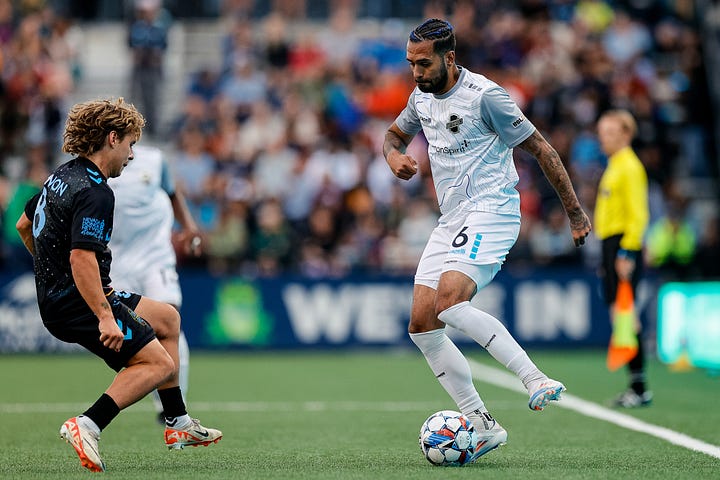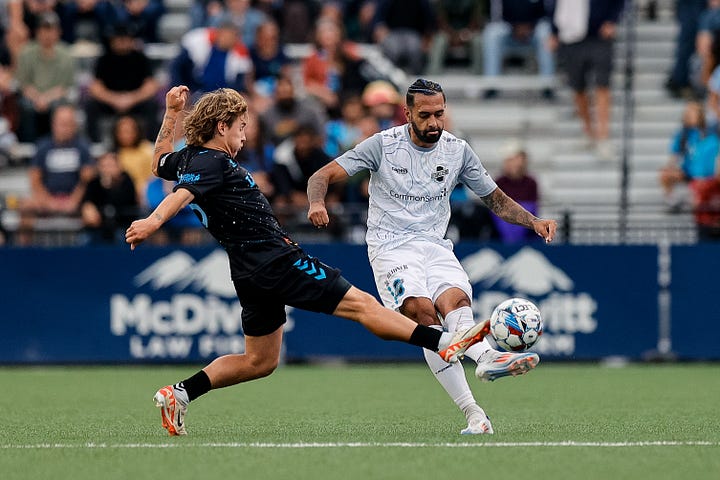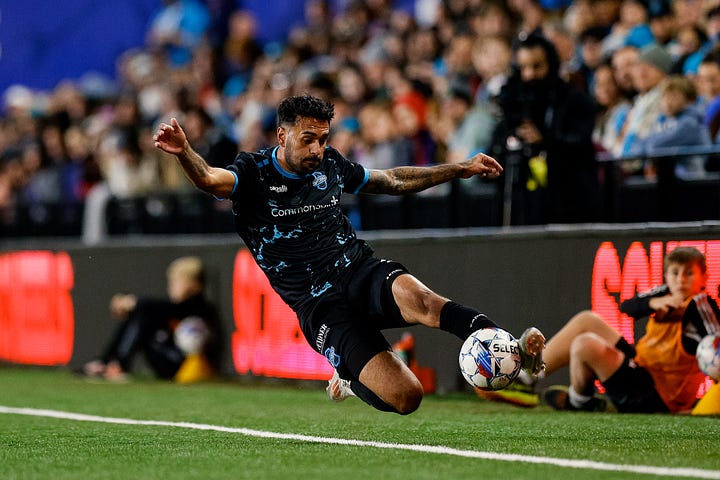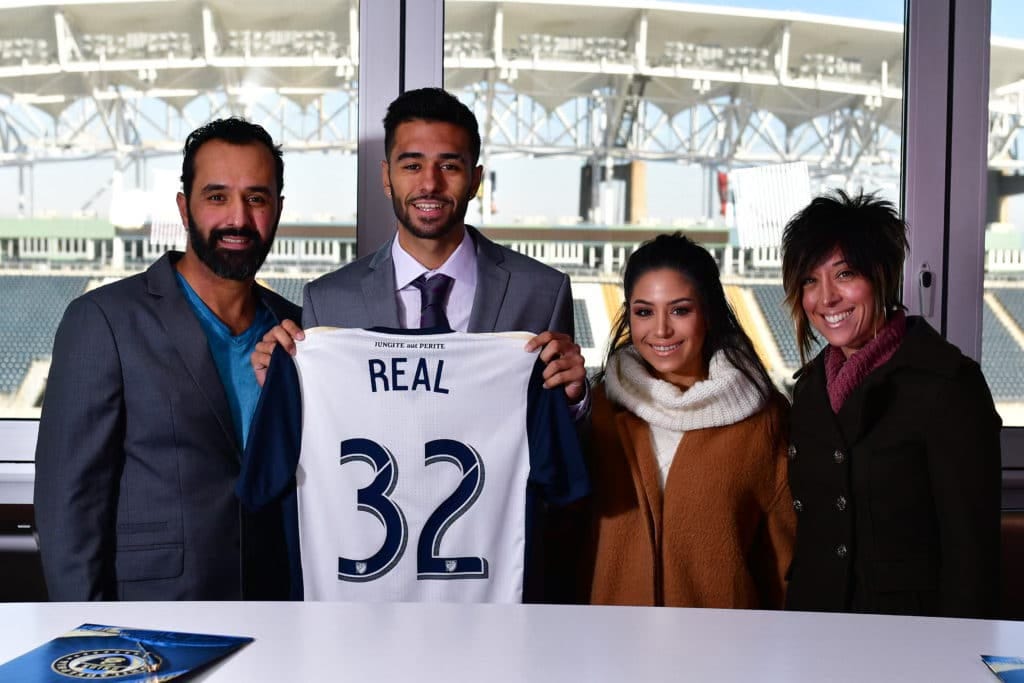A Chat with Matt Real - Union Homegrown on the Precipice of Winning the USL Title
From Depth Piece to Starter: What Made the Difference?
Matt Real has been a part of the Union organization from an early stage, joining the academy at the U-14 level and working his way through the ranks to sign a Homegrown contract in 2018, becoming the seventh player in team history to do so.
Despite his development, Real’s playing time with the Union’s MLS side was limited, often splitting his career between Bethlehem Steel/Union II in the USL and occasional first-team appearances. Fast forward to 2024, and Real embraced a fresh opportunity to revitalize his career with a loan to the Colorado Springs Switchbacks.
Now, after 29 appearances—28 of them starts—and over 2,400 minutes on the field, Real has established himself as a key player for the Switchbacks, a team on the brink of claiming the USL Championship title this weekend.
What made the difference for Matt? I sat down with the Drexel Hill native to discuss his journey, the differences in play across leagues, and how this new chapter has reignited his passion for the game.
Full audio here, but continue to scroll for video and full transcript.




How comforting has it been to join Colorado Springs, considering the connections, and how have you embraced the opportunity?
Real: “I personally couldn’t have asked for a better or smoother transition from both sides. Philly was really helpful in getting me here. And personally, when the Switchbacks reached out, this was the first place I wanted to come if I was going to the USL for multiple reasons. The connections I already have with my teammates—I already knew Matt Mahoney and Zach Zandi. Obviously, the coaching staff: James Chambers was my ex-teammate with Bethlehem Steel during my first professional season with them. Then we have Hoagie, the sporting director here, who was our assistant at Bethlehem. And Al, who was involved with Reading—we would always see him around the facility as well, working with his guys.
So, it really couldn’t have been a smoother transition from both sides. The Union made it really easy for me to come here and integrated me into the group seamlessly. It’s a great group of guys, hungry for a goal that we had. Obviously, we didn’t have the best start before I got there—I think we were 0-5—but I’m really happy we were able to gel together. And obviously, right now, it’s been a crazy playoff run, but to be where we are really shows the integrity and competitiveness of the squad to never give up.”
What has been the difference for you this year?
Real: “I think a big part, a big role, is the consistency. When I was back in Philadelphia, there wasn’t much consistency regarding who I was going to play with on the weekend or whether I was going to travel with the first team. It was kind of a last-minute type of deal, which is normal when you’re with the first team—you don’t really know what the squad needs until Thursday or Friday. So you’re not really aware of what your status is going to be for the weekend until Thursday or Friday. Sometimes, if you’re lucky, you might know by Wednesday.
But here, there’s only one group. There’s no first team and second team. So you know what to focus on. It’s good for building a rhythm as well, knowing you’re going to play every weekend and working on the things you need to improve. Whereas in Philly, some games I’d play with the second team, then I wouldn’t play for a month or two. So you’d kind of lose that rhythm…”
What is it about this fanbase that is different?
Real: “Nothing against Philly fans—I think they’re the toughest fans to play for in America, across every single sport, not just soccer. We’re talking about everything, and you can see that if you follow other sports as well. In Philly, there’s definitely a bit more pressure to perform. Obviously, I didn’t feel a lot of that pressure because I wasn’t playing week in and week out. But I know the guys who do play regularly definitely feel it—they talk about it in the locker room, about trying to keep the fanbase happy, which is a major part of an organization. You want to keep the fans coming to games, you want to fill seats.
Coming here, it was kind of a refresh. The fans are definitely less hostile, I’ll tell you that. If we’re losing, they’re never really booing us—they’re always encouraging us to do our best. And there are positives on both sides, right? In Philly, I’m not going to say the fans shouldn’t boo if we’re not performing because that’s just a different atmosphere. Sometimes, that will encourage certain players to step up. But it is a difference.
I’m not going to say what I prefer more because both sides have their positives. In Philly, having that passionate fanbase is a big advantage when away teams come in—they feel it. Colorado fills up, probably top five in the league in terms of attendance, and away teams definitely notice our fans’ presence. And yes, they’re hostile, though not quite like Philly fans, which I think anyone who’s played in both places would agree with.
Here, it also helps that we have the altitude on our side.”
How has this opportunity improved all aspects of your life—physically, mentally, and spiritually?
Real: “I think every single person who starts playing a sport—whether it’s soccer, basketball, or any other—does it because they fell in love with the game. They enjoy playing. So of course, when I became a professional athlete for the Philadelphia Union, I achieved one of the goals I had always dreamed of. But I wanted more. I wanted to play consistently.
When you’re not playing regularly, you go through mental struggles and roadblocks that make you start to lose the enjoyment of the game. You’re watching your teammates and friends play, enjoying the wins, and being part of victories, while you’re not really experiencing that yourself. That was my situation in Philly. I was always happy for the group when we were doing well, and I’d get my moments to play, but, as you mentioned, it was nowhere near as much as I wanted or as much as I’m playing now.
Being here has been a completely fresh breath of air—experiencing something new and something I’ve been waiting for my entire career. I’ve been involved in every single game, in the victories, in the losses, and in the highs and lows of the season. That’s why I started playing this sport in the first place—to feel that. But during my last year or two in Philly, I started to lose that sense of enjoyment. It felt like I was just showing up to train and helping the starters get better. But what about me? At some point, you have to look at yourself and ask, Am I enjoying this? Because if you’re not, why are you doing it?
Team success is really important, of course, but if I wasn’t enjoying what I was doing, something had to change. When I spoke to the staff about it, they understood. Jim (Curtin)—he always had my back and what was in my best interest. But at the time, things just weren’t working because there were so many moving parts. The team needed depth, and I understood that. I never argued against it.
I’m just happy I was finally able to get my opportunity. And I got lucky that this was the year I was able to leave and join a team that’s made such a rare and incredible playoff run. That doesn’t happen often, and I’m embracing every moment, taking it all in one step at a time. Now, we’ve got one big game left this weekend, and I’m hopeful we can bring it home.
It’s been a roller coaster, but it’s definitely been a journey worth taking.”
It’s been an incredible run this year, with many moments you can be proud of, both personally and as a team. What stands out the most?
Real: “Personally, I’m just going to give you a snapshot of how the year went in terms of where we were mentally. When I first got here, the goal was to get back into the playoffs, you know? So once we started hitting our stride—I think it was a four- or five-game winning streak—we got back in pretty quick. Once we hit that, the group—
we knew we had the potential to really cause some trouble. In the first five games, obviously, I wasn’t here, and I don’t know how much you know about them, but apparently, a lot of luck wasn’t going in our direction. We weren’t finishing chances. We were conceding late goals—little things like that. We were competing with top teams but just not getting results. So once we started hitting our stride, we were like, Wait a minute, we have something really special here. We have a huge advantage at home.
Teams have a really tough time playing here. As the season progressed, we kept getting results and climbing the table. Once we hit a certain point, we raised our expectations of ourselves. We were like, Look, we don’t just want to make the playoffs; we want a home game. You can see how important that’s been during this whole run—we’ve been home every single game. So rising in the table was really important because we knew that if we had the advantage of playing at home throughout the entire playoffs—it would be really tough for anyone to come here and beat us, no matter what position they were in. So I think the first big moment for us—answering your question—was beating Sacramento in the last game of the season to secure the second-place spot. Once we hit that mark, we knew that teams coming to our building would have a really tough time, no matter who it was. Securing that second-place spot set us up to make a deep run.
It was kind of in our hands. If we were going to lose, it would be because of us, not because another team outplayed us. It would be because we made a mistake that led to them beating us. You know what I mean? So I would say my biggest moment and snapshot of the year was probably that game. That game marked the end of the regular season—and to finish in second place. All year long, we had chances to grab second place, but we let it slip. We had a few heartbreaking losses at home. Ending the year like that, in what was basically a playoff-type game, really set us up heading into the playoffs. In our first two playoff games, we already had that experience of what it felt like to be really fighting for something. That last game against Sacramento was really important for us. If we’d lost, I think we would’ve had to be on the road for most of the playoffs.
And that’s huge—home-field advantage is everything in this competition. So that would probably be the biggest moment for us. And then, of course, winning the Western Conference is a whole other thing on its own. But if I had to pick one significant moment that stands out, it would be that.”
“Rhode Island has some familiar faces in Karl Spratt and Dave McKay. What are your thoughts on Rhode Island, the Union staff there, and how those connections have developed over the short history of the team?”
Real: Real: First off, I’m really happy for Dave and Karl. I’ve spoken to Dave a few times, like when he had left originally and then when he came here, we had a nice chat. I was really happy for him that he was able to be involved with the team and be on the coaching staff, you know?
And then as well as Karl, because he was a goalkeeper coach over with Union II. Two great guys who really helped a lot in my development. Even though in Philly, Dave was— I don’t want to give him the wrong label here, but he was our strength coach/conditioning coach/assistant. He would do all of those things. He helped me in all aspects of the game—in the gym and on the field. He would always come and give me advice on things he thought I needed to do better.
And not even by going to the coaches about it—just him, you know, giving personal advice based on his experience. I really thank him for that because he helped me with a lot of my development and mindset. I’m really happy for them.
Secondly, for that Rhode Island team—yeah, they’re just a good team that always finds a way to not get beat. They’re a tough team to beat. Whether that’s coming from behind, they have a lot of character in that sense of never giving up. There were a lot of games this year where they were down, but they scored goals to tie at the end of games. You see the character they’ve built.
During the playoffs, they go to Louisville—what was the score? I think 3-0, something like that, right? Especially in that atmosphere. With the season they’ve had, that’s extremely difficult. So we’re not taking them lightly whatsoever. They haven’t been home for one single game this whole playoff run, and they’ve overcome adversity every single game.
For us, it’s definitely a tough matchup. We had them earlier this year. We did beat them at home, but it wasn’t a tough game. And we know they’ve made a lot of changes to that squad—tactically and personnel-wise. I believe they also have a great coach. I think his name is Khano, right?
I’ve heard a lot of good things about him as well. So it’s definitely a matchup we’re not going to take lightly. It’s a final—anything can happen in finals. Momentum can shift very easily. But, you know, I’m not going to lie and say that we don’t have an advantage with the altitude and the timing of the game. I know they had to fly in a little earlier, which means the longer they’re at altitude, the harder it’s going to be for them. A lot of teams like to come in the night before so they feel it less. But if you come in two or three days before, it actually hurts you more.
We’re going to try to use that to our advantage. And we’re confident that if we stick to the principles we’ve been leaning on throughout the year—all the building blocks—and our foundation stays solid, we have what it takes to lift the trophy at the end.”
The Colorado Springs Switchbacks and Rhode Island F.C. kick off on Saturday at 12 PM EST. You can watch the game on CBS and TUDN, or listen to it on SiriusXM.




